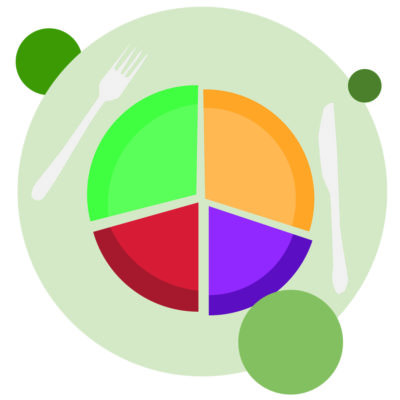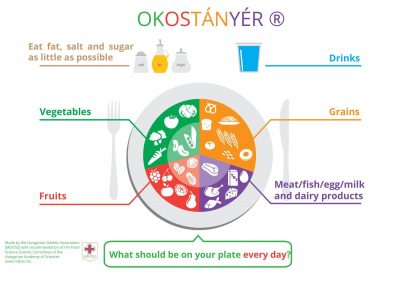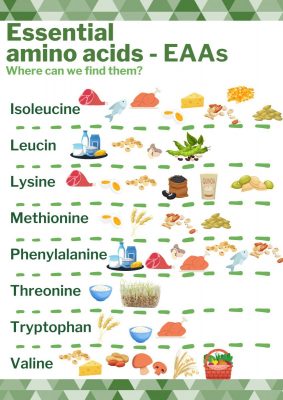 How to do it smartly?
How to do it smartly?
The secret to health-conscious nutrition does not lie in cutting out certain foods or nutrients but in their conscious consumption. Whatever diet or food we opt for, we always have to strive for balance instead of drastic reduction. Besides the intake, we also have to pay attention to proportions, since omitting (or insufficiently replenishing) nutrients may lead to deficiency diseases. The dietary guide Okostányér (smart plate) provides professional advice to facilitate healthy nutrition.

According to its recommendations, healthy nutrition is based on the consumption of fruits, vegetables, cereals, meats, fish, eggs, milk and, dairy products in appropriate proportions. Daily physical exercise is recommended while snacking more than occasionally is not advised.
We can optimally meet our daily energy needs by eating 3 main and 2 smaller meals, and by drinking at least 2 to 2.5 liters of fluid. One of the most important meals is breakfast since this is the first time our body receives nutrients during the day. Irregular eating increases the risk of under- and overnutrition.
Carbohydrates
Carbohydrates (aside from proteins and fat) are among the most energy-dense nutrients. They are divided into the groups of simple (e.g. sugar) and complex carbohydrates (e.g. fiber, starch). They constitute the basis of our daily energy intake since we meet 50-55% of our energy needs by consuming carbohydrates, most of which should ideally be complex carbohydrates.
Proteins
Protein intake is vital, and the intake of essential amino acids is a necessity. Animal proteins are the main sources of complete proteins for the body.
If we limit or omit their intake, special nutritional rules are necessary to ensure sufficient protein intake.

Complete protein sources include meat, fish, milk, dairy products, and eggs. When choosing animal protein sources, we also need to pay attention to other nutrients present (fat, carbohydrates, and trace elements). Plant-based protein sources are mostly ‘incomplete’ since they either lack or only partly contain some of the essential amino acids, nonetheless, they are still important for the body. The recommended intake for an adult with an average level of physical activity is between 0.8 and 1.2 grams / BMkg. Consuming too much protein unnecessarily burdens the body.
Fats
Aside from carbohydrates and proteins fats are also indispensable for having a healthy body. Their role is pivotal in body composition and metabolism, while also serving as a source of energy. They facilitate the absorption of fat-soluble vitamins and contribute to maintaining our body temperature. Adipose (fat) cells also provide mechanical protection, and are necessary for the composition of cell membranes, the operation of certain hormones, and the production of vitamin D. The latter is not only necessary for the long-term preservation of bone integrity but also serves to strengthen the immune system. 15-30% of our daily energy intake needs to be comprised of fats; one gram of fat yields twice as much energy as the same amount of carbohydrates or protein. Fat is indispensable, however, the question of quality is also quite important in its case.
Unsaturated and polyunsaturated fatty acids are the most beneficial for the body. It is important that our saturated fatty acid intake should not exceed 10% of the daily energy intake. Plant oils are preferable since they typically contain more unsaturated fatty acids than animal fats, however, we must be aware of certain exceptions. Coconut oil, for example, is not recommended due to its extremely high saturated fat content.
Okostányér (smart plate) is currently the official, evidence-based dietary guide which can aid us in learning the basics of health-conscious nutrition and in creating our own diet. It is available behind the following link.
Are food supplements ’miracle foods’?
Food supplements are quite popular nowadays as well as being readily available in seemingly untraceable quality and quantity on the market. Thus several questions can be raised: how can we opt for the right one, what does our body truly need, and in what quantity? First of all, we need to stress that these products can not replace any foods or specific dishes. They may only be taken considering nutritional recommendations and our current health status (based on medical test results). In case of any uncertainty, we need to consult our doctors, dietitian, or nutritionist about their usage. Further information on tested health supplements can also be found on the website of the National Institute of Pharmacy and Nutrition.
We must only rely on information from credible sources!
Graphic1: Magyar Dietetikusok Országos Szövetsége – http://www.okostanyer.hu/
Graphic2: Egészségfejlesztési Központ